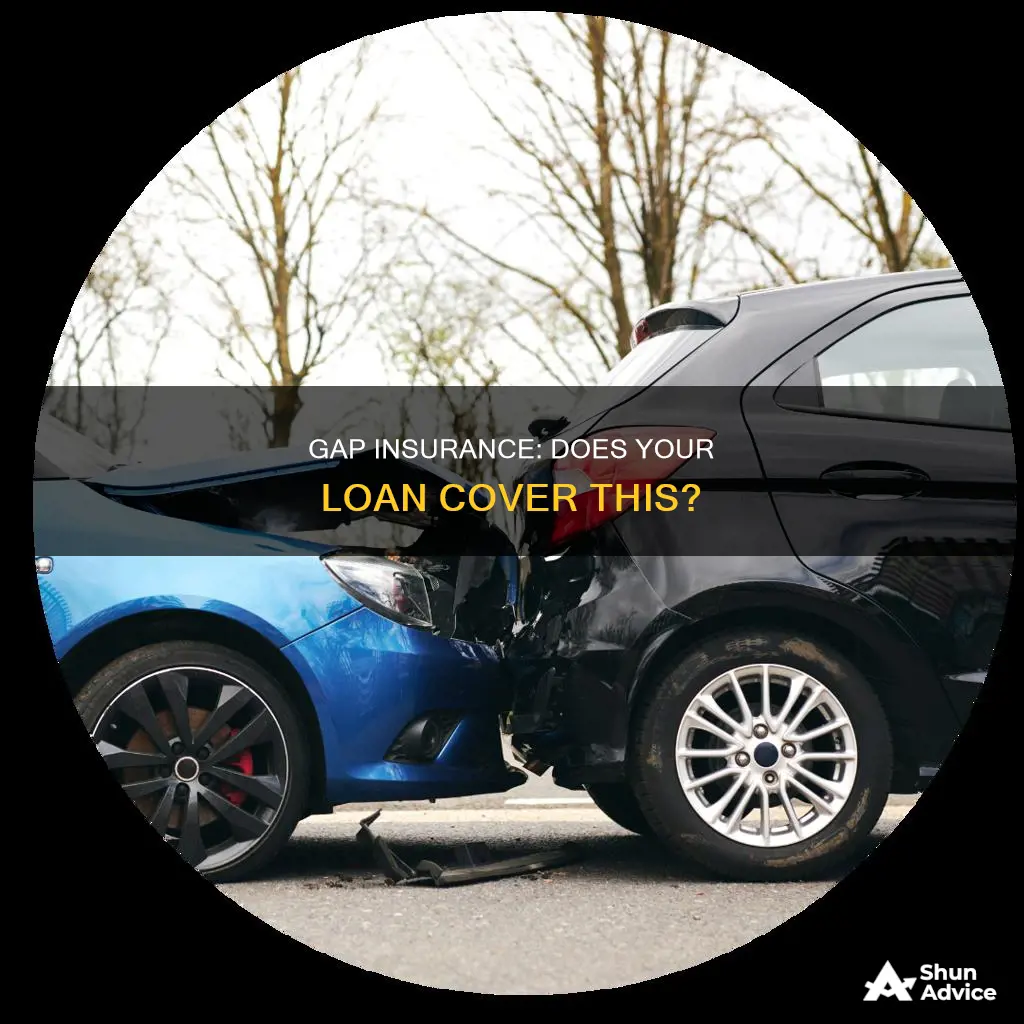
GAP insurance, or Guaranteed Asset Protection, is an optional auto insurance coverage that applies if your car is stolen or deemed a total loss. It covers the difference between the amount paid out by your comprehensive or collision coverage and the balance left on your vehicle loan or lease. This type of insurance is particularly useful if you have a large car loan or a vehicle that depreciates quickly in value. GAP insurance can be purchased from a car insurance company or dealership, but it's important to note that the terms and exclusions may vary. When considering whether your loan has GAP coverage, it's essential to carefully review the specific terms and conditions of your loan agreement and insurance policy to determine if GAP coverage is included and understand any limitations or exclusions that may apply.
| Characteristics | Values |
|---|---|
| What is GAP insurance? | Optional auto insurance coverage that applies if your car is stolen or deemed a total loss. |
| When do I need GAP insurance? | When the amount you owe on your car loan is more than the car's worth. |
| When is GAP insurance useful? | When you lease your car, make a lower down payment, or have a longer financing term. |
| What does GAP insurance cover? | The difference between the amount paid out by your comprehensive or collision coverage and the balance left on your vehicle loan or lease. |
| What does GAP insurance not cover? | Engine failure, transmission failure, mechanical repairs, injuries, death, or funeral costs. |
| When can I cancel GAP insurance? | When you pay off your loan early, sell the vehicle, or when the amount you owe is less than the car's worth. |
| Where can I get GAP insurance? | From a car insurance company or a dealership. |
What You'll Learn

When is gap insurance worth it?
Gap insurance is an optional auto insurance coverage that applies if your car is stolen or deemed a total loss. It covers the difference between the amount paid out by your comprehensive or collision coverage and the balance left on your vehicle loan or lease. For instance, if you owe $25,000 on your loan and your car is only worth $20,000, without gap insurance, you would receive a $20,000 payout. However, with gap insurance, you would receive the extra $5,000 needed to pay off your loan.
Gap insurance is worth considering when there is a significant difference between your car's actual value and what you still owe on it. This could be due to a smaller down payment, a longer financing term, or a higher depreciation rate. For example, if you made a down payment of less than 20% of the sale price, you may end up with negative equity on the vehicle. Similarly, a longer financing term increases the chances of owing more on the vehicle than it is worth due to depreciation. Electric vehicles, in particular, tend to depreciate faster than other vehicle types, losing about half of their value in five years.
Gap insurance is also recommended when leasing a car, as lenders may require gap coverage on leased vehicles. Additionally, if you have a very long loan term or a high-interest rate, gap insurance can provide added financial security. For instance, a loan term of 84 months or an APR of 15% may warrant the need for gap insurance.
Furthermore, gap insurance can be beneficial if you drive a lot of miles, causing your car to depreciate quicker than your loan balance. In such cases, the value of your car could be lower than the payoff amount in the event of a total loss. However, it is important to note that gap insurance does not cover all expenses. It does not include engine failure, transmission failure, or other mechanical repairs.
Ultimately, the decision to purchase gap insurance depends on your individual circumstances and the specific terms of your loan and insurance policies. It is a relatively low-cost coverage option, typically ranging from $500 to $700, or an additional $20 per year to your car insurance. However, it can provide financial peace of mind and protect you from paying money out of pocket if your vehicle is stolen or totaled.
Interlibrary Loans: How to Access Books from Other Libraries
You may want to see also

What does gap insurance cover?
Gap insurance is an optional auto insurance coverage that applies if your car is stolen or deemed a total loss. It bridges the gap between what you owe on your car loan and what your car is actually worth. This "gap" occurs when you buy a new vehicle and its value starts to depreciate immediately.
Let's say you buy a new vehicle with a $25,000 loan. You get into an accident, and your vehicle is totaled. At the time of the accident, your vehicle is valued at $15,000, but you still owe $20,000 on your loan. For a covered loss, you would get paid for the value of your vehicle at the time of the incident ($15,000). This leaves $5,000 still owed on your loan. With gap insurance, the difference would be covered, minus any deductible.
Gap insurance is especially useful if you have a large car loan or a vehicle that quickly depreciates in value. Electric vehicles, for example, tend to lose about half of their value in five years. Gap insurance can also be beneficial if you made a smaller down payment on your car, have a longer financing term, or are leasing your vehicle.
It's important to note that gap insurance does not cover additional charges related to your loan, such as finance or excess mileage charges, engine failure, or other repairs. It also does not cover injuries, death, medical expenses, lost wages, or funeral costs.
Your Boyfriend's Finances: Loan Approval Impact?
You may want to see also

What doesn't gap insurance cover?
Gap insurance is an optional auto insurance coverage that applies if your car is stolen or deemed a total loss. It covers the difference between the amount paid out by your comprehensive or collision coverage and the balance left on your vehicle loan or lease. However, there are certain instances where gap insurance does not provide coverage.
Firstly, gap insurance does not cover engine failure, transmission failure, or any other mechanical repairs. It also does not cover injuries, death, or funeral costs resulting from an accident. Gap insurance is solely intended to cover the total loss of a vehicle, not any other damages that result from an accident.
Additionally, gap insurance does not cover certain charges related to your loan, such as finance charges, credit insurance charges, extended warranties, lease penalties for high mileage, or excess mileage charges. It is important to note that gap insurance also does not cover the down payment for a new car or any overdue payments and late fees on your car loan or lease.
Furthermore, gap insurance will not provide coverage if the policy has lapsed due to non-payment of premiums or if the claim exceeds the policy limits. If the vehicle is not deemed a total loss, gap insurance will not cover the costs, and it is also not applicable if there is any fraud or misrepresentation on the policyholder's application for coverage.
Budgeting for Loans: Strategies for Financial Success
You may want to see also

When should you cancel gap insurance?
Gap insurance is an optional auto insurance coverage that applies if your car is stolen or deemed a total loss. It covers the difference between the amount paid out by your comprehensive or collision coverage and the balance left on your vehicle loan or lease. This type of insurance is useful when there is a significant difference between your car's value and the amount you owe on your loan.
You should consider cancelling your gap insurance when the balance of your loan or lease is less than your car's value. This usually happens after a few years, as new cars tend to lose value quickly. If you pay off your loan early or sell your vehicle, it is also advisable to cancel the policy.
If you have bought gap insurance through a dealership, you can cancel it once your loan or lease is paid off. You may also receive a refund for any additional months of coverage that you have already paid for. However, some companies may send you a check instead of removing the balance from the principal.
It is important to note that gap insurance does not cover all expenses. It does not cover engine failure, transmission failure, or any other mechanical repairs. It also does not cover injuries, death, or funeral costs. Therefore, it is essential to review the exclusions in your policy to understand what is and isn't covered.
Affirm Loan Repayment: What Happens When Returning Purchases?
You may want to see also

Where can you buy gap insurance?
Gap insurance is an optional auto insurance coverage that applies if your car is stolen or deemed a total loss. It covers the difference between the amount paid out by your comprehensive or collision coverage and the balance left on your vehicle loan or lease. This type of insurance can be purchased from a variety of sources, including:
Car Dealerships
When you buy a new car, your car dealership may offer you gap insurance. Dealership gap insurance is typically included when purchasing a vehicle, but you can decline it. However, it is generally more expensive than buying gap coverage from an insurance company, as the cost is added to your principal, which is then used to calculate your interest. Some dealerships may also include a cancellation form and a 30-day cancellation period, allowing you to cancel your gap insurance and receive a full or partial refund.
Auto Insurers
You can typically get gap insurance through your auto insurance company. Many insurers offer gap coverage or a similar option like loan/lease payoff coverage. Adding gap insurance to your existing auto insurance policy is more common than purchasing it as a standalone policy. It is important to note that if you have car insurance through one company, you usually cannot buy gap insurance from a different standard car insurance company.
Credit Unions
Some people have recommended shopping around at local credit unions for gap insurance. They may be able to offer competitive rates, and they can also help you find the best rate from other providers.
Major Insurance Companies
You can also purchase gap insurance from several major insurance companies, including Progressive, Nationwide, State Farm, and Allstate.
Uninsured Loaner: What Does My Insurance Cover?
You may want to see also
Frequently asked questions
Gap insurance is an optional auto insurance coverage that applies if your car is stolen or deemed a total loss. When your loan amount is more than your vehicle is worth, gap insurance coverage pays the difference.
Gap insurance might be a good option if there is a significant difference between your car's actual value and what you still owe on it. This could be because you leased your car, made a smaller down payment, or have a longer financing term.
Gap insurance covers the difference between the amount paid out by your comprehensive or collision coverage and the balance left over on your vehicle loan or lease. It does not cover engine failure, transmission failure, or any other mechanical repairs.







